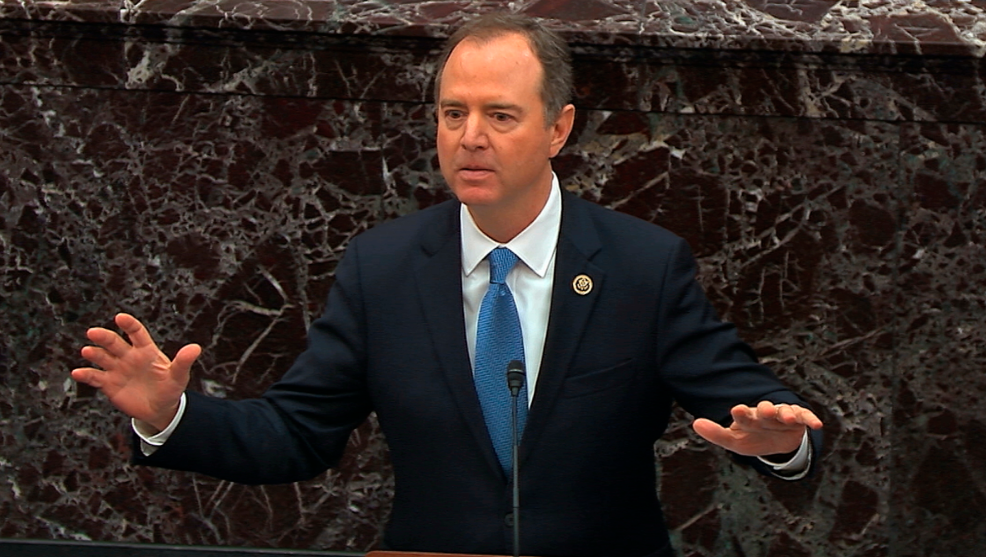Tom Williams/CQ Roll Call via Zuma
Rep. Adam Schiff (D-Calif.) has been a relentless chaser of Trump corruption. As the top ranking Democrat on the House Intelligence Committee in 2017 and 2018, he pushed for a robust investigation of the Trump-Russia scandal, as the Republicans then in control of the House resisted such efforts and sought to protect Donald Trump. After Schiff became chairman of the committee last year, he oversaw the congressional probe of the Trump-Ukraine scandal, ran the House impeachment hearings, and led the House impeachment managers during the Senate trial. Once Trump was acquitted by the Senate Republicans, it seemed that Schiff’s investigative pursuits might peter out in the remaining months before the coming election. But the coronavirus pandemic and Trump’s lackadaisical and inept response has raised questions about the intelligence that was shared with the White House about the looming crisis—it’s been reported Trump received classified warnings in January and February—and whether Trump ignored the intelligence. And Schiff says he is now on the case.
In an interview with Mother Jones, Schiff notes that his intelligence committee is investigating what information the intelligence community obtained in the early days of the coronavirus epidemic, what material reached Trump, and how the president responded. Schiff says this review seeks to “determine when did the intelligence community first start reporting about this. What were they telling us, frankly, about the danger of pandemics even before this one? What did they first observe going in in China? When did it first make its way into the President’s Daily Briefing [from the intelligence agencies] or get briefed to Congress?”
Listen to David Corn’s in-depth interview with Rep. Adam Schiff on this week’s edition of the Mother Jones Podcast.
Schiff points out that there has been much public reporting “in terms of when the earliest indications[were],” but many questions remain: “What level of the intelligence community was concerned about this? Was it flashing red lights, as some have characterized it, or was it much less, as others have characterized it?” Part of the investigation will focus on what Trump knew and when he knew it: “So much of the information was in the public record. You had the Chinese reporting the virus. You had the WHO reporting the virus. You had the president’s own people publicly talking about the danger and even well after the virus was an established fact—that it was spreading and coming to the United States—you still had the president talking it down like it would be no worse than the flu…and it was under control.”
Another component of the committee’s investigation, according to Schiff, is an examination of how the intelligence agencies interacted with other parts of the federal government, as the coronavirus threat emerged. “You would hope,” Schiff says, “that as various health agencies are hearing about and learning about this new respiratory disease in China and the Chinese government is making declarations about it, that you could turn to the intelligence community to try to find out the ground truth of those representations. Is it as bad as the Chinese say? Is it worse than what the Chinese have to say? What do we know about whether it is appearing in other countries?”
Members of Congress did receive briefings from the intelligence community on the spread of the coronavirus, but Schiff won’t characterize what they were told until his investigation is further along. Part of the review will focus on whether Congress was fully briefed on the threat. “We’ll want to know when…the chief executive was informed,” Schiff remarks.
Schiff says that the committee will “absolutely” hold hearings and release a report on the coronavirus intelligence. But it won’t be easy to do this quickly. The investigation will require questioning witnesses in classified sessions—”something we don’t have the capacity to do right now,” Schiff explains, given that social distancing prevents gatherings of legislators, staffers, and witnesses in the tightly-controlled and shielded areas used for meetings that cover top-secret information. He adds, “We’re really just beginning the review and we want to get it right. I don’t want to leap to a conclusion one way or another.”
Schiff has also introduced a bill that would establish a commission—modeled on the 9/11 commission—that would kick into action early next year and investigate the US government’s preparation (or lack thereof) for the coronavirus crisis and the steps and missteps the Trump administration took in reacting to the pandemic.













